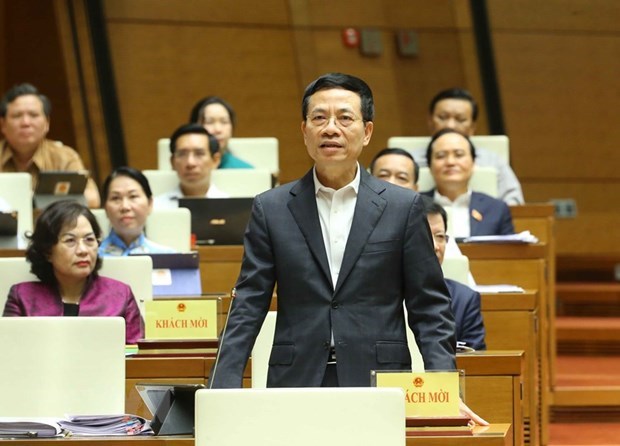 |
|
Minister of Information and Communications Nguyen Manh Hung at the Q&A session (Photo: VNA) |
Việt Nam aims to roll out the 5G network more widely in 2021, taking advantage of existing 4G infrastructure for faster deployment, information minister Nguyễn Mạnh Hùng stated.
During a question and answer at the National Assembly on Friday in Hà Nội, asked about the progress of the national 5G network, Minister of Information and Communications Hùng said Việt Nam’s progress was “not slow” or out of line with the international speed.
When the standards for the fifth generation of mobile technologies were issued by the International Telecommunication Union earlier this year, Việt Nam started commercial trials on a limited scale and wide implementation could be expected next year, Hùng said.
2G network technology started to be used in the country in about 1992, not too far behind other countries but Việt Nam lagged behind globally by 7-8 years in terms of 3G and 4G networks, the minister continued.
The deployment of 5G in Việt Nam would make use of about 70 per cent of the existing 4G infrastructure – including base transceiver stations, antennas, and other transmission equipment – translating to sizeable cost-saving, Hùng asserted.
“Once 5G rollout reaches a certain stage, 2G and 3G cellular networks will also be switched off to lower the telecommunications groups’ operating costs,” the minister told the parliament.
He said he was also confident that 5G equipment and devices to be used by telecommunications and mobile operators will be fully Vietnamese-made, of high technology and come at more affordable prices than imported versions.
Naturally, the rollout of 5G will start first in major urban areas, which will be followed by industrial parks, research zones and universities to aid innovation and creation of new technologies, the minister added.
In early November, the Việt Nam Telecommunications Authority under the Ministry of Information and Communications said it was working on new national technical regulations for terminal devices of terrestrial mobile communication, which will require that all portable data terminals (PDTs) made in, sold or purchased in Việt Nam will have to support 4G and 5G technologies.
This means phones that only support 2G and 3G networks might no longer be manufactured in Việt Nam or imported into the country when the new regulation comes into effect as an effort to phase out these older technologies, Hùng said.
The regulation is expected to be issued in December and take effect from July 2021.
Users of the military-run telecom provider Viettel in Hà Nội and HCM City might soon experience 5G as it received a licence for commercial tests from the Ministry of Information and Communications earlier this month.
With regard to e-government, Hùng said the robust implementation of digital technology would be key to achieving the goal of having 30 per cent of public administration services reaching level 4 by the end of this year, meaning all procedures, including fee payment, would be carried out entirely online and citizens do not have to go to administration centres.
He was confident the goal would be reached, and the ratio would increase to 100 per cent next year thanks to a range of measures from the information ministry. — VNS